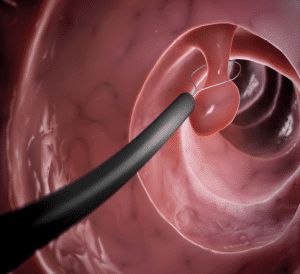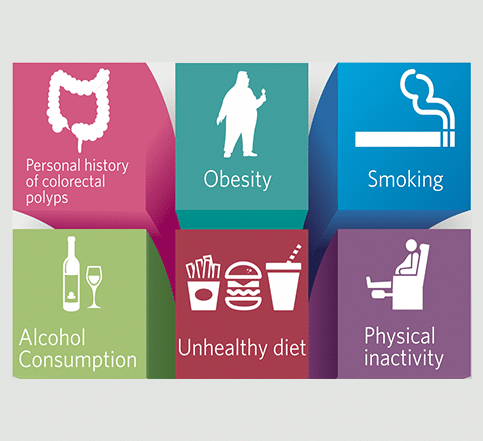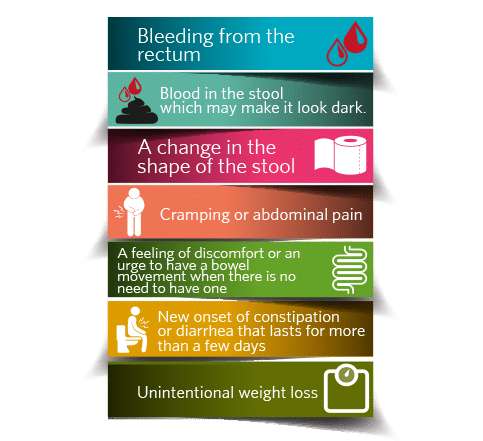Colorectal Cancer
Colorectal cancer is uncontrolled growth of abnormal cells in the colon or the rectum.
Most colorectal cancers begin as a growth called a polyp on the inner lining of the colon or rectum. Some types of polyps can change into cancer over the course of several years, but not all polyps become cancer.
.

Modifiable risk factors
- Obesity
- Smoking.
- Alcohol consumption
- Unhealthy diet that is high in red meats and processed meats
- Physical inactivity

Non-modifiable risk factors
- Age
Incidence and death rates for colorectal cancer increase with age (50 years and older)
- Gender
Colorectal cancer incidence and mortality rates are higher in men than in women.
- Family history
First-degree relative (parent, sibling, or child) with colorectal cancer or polyps. The risk is even higher if that relative was diagnosed with cancer when they were younger than 45, or if more than one first-degree relative is affected.
- Inflammatory bowel disease.
-
- Crohn’s disease
- Ulcerative colitis
- Diabetes type 2
- Personal history of colorectal polyps
- Bleeding from the rectum
- Blood in the stool which may make it look dark.
- A change in the shape of the stool
- Cramping or abdominal pain
- A feeling of discomfort or an urge to have a bowel movement when there is no need to have one
- New onset of constipation or diarrhea that lasts for more than a few days
- Unintentional weight loss
- Weakness and fatigue

What can I do to lower my risk of bowel cancer?
In addition to screening, you can make certain lifestyle choices to lower your risk:
- Don’t smoke: Smoking increases the risk of all digestive system cancers, including bowel. Quitting has tremendous benefits for your overall health.
- Control your weight: Obesity increases the risk of bowel cancer. For every five-point decrease in body mass index above the normal range, you decrease your risk by 15%. For instance, a BMI drop from 35 to 30 results in a 15% risk reduction.
- Get at least 150 minutes per week of aerobic activity. Physical activity has a demonstrable protective effect on bowel cancer risk.
- Limit your consumption of red meat. Studies show bowel cancer risk is 17-30% higher per 100-120g/day of red meat intake. Decrease portions or choose chicken or fish instead.
- Eat fruit and starchy vegetables. The antioxidants and fiber in dark leafy greens, beets, squashes, bell peppers, tomatoes, asparagus, carrots, cauliflower, cabbage, broccoli, green beans, and fruit have a protective effect against bowel cancer.
- Eat fibre. Fiber-rich foods like beans, seeds, nuts, oatmeal, edamame, dry roasted chickpeas and bran cereal escort carcinogens out of the body.
- Avoid exposure to radiation and environmental pollution.
- Avoid alcohol.
- + Risk factors
-
Modifiable risk factors
- Obesity
- Smoking.
- Alcohol consumption
- Unhealthy diet that is high in red meats and processed meats
- Physical inactivity

Risk factors of colorectal cancer Non-modifiable risk factors
- Age
Incidence and death rates for colorectal cancer increase with age (50 years and older)
- Gender
Colorectal cancer incidence and mortality rates are higher in men than in women.
- Family history
First-degree relative (parent, sibling, or child) with colorectal cancer or polyps. The risk is even higher if that relative was diagnosed with cancer when they were younger than 45, or if more than one first-degree relative is affected.
- Inflammatory bowel disease.
-
- Crohn’s disease
- Ulcerative colitis
- Diabetes type 2
- Personal history of colorectal polyps
- + Early signs and symptoms
-
- Bleeding from the rectum
- Blood in the stool which may make it look dark.
- A change in the shape of the stool
- Cramping or abdominal pain
- A feeling of discomfort or an urge to have a bowel movement when there is no need to have one
- New onset of constipation or diarrhea that lasts for more than a few days
- Unintentional weight loss
- Weakness and fatigue

Signs and symptoms of colorectal cancer - + Prevention
-
What can I do to lower my risk of bowel cancer?
In addition to screening, you can make certain lifestyle choices to lower your risk:
- Don’t smoke: Smoking increases the risk of all digestive system cancers, including bowel. Quitting has tremendous benefits for your overall health.
- Control your weight: Obesity increases the risk of bowel cancer. For every five-point decrease in body mass index above the normal range, you decrease your risk by 15%. For instance, a BMI drop from 35 to 30 results in a 15% risk reduction.
- Get at least 150 minutes per week of aerobic activity. Physical activity has a demonstrable protective effect on bowel cancer risk.
- Limit your consumption of red meat. Studies show bowel cancer risk is 17-30% higher per 100-120g/day of red meat intake. Decrease portions or choose chicken or fish instead.
- Eat fruit and starchy vegetables. The antioxidants and fiber in dark leafy greens, beets, squashes, bell peppers, tomatoes, asparagus, carrots, cauliflower, cabbage, broccoli, green beans, and fruit have a protective effect against bowel cancer.
- Eat fibre. Fiber-rich foods like beans, seeds, nuts, oatmeal, edamame, dry roasted chickpeas and bran cereal escort carcinogens out of the body.
- Avoid exposure to radiation and environmental pollution.
- Avoid alcohol.
